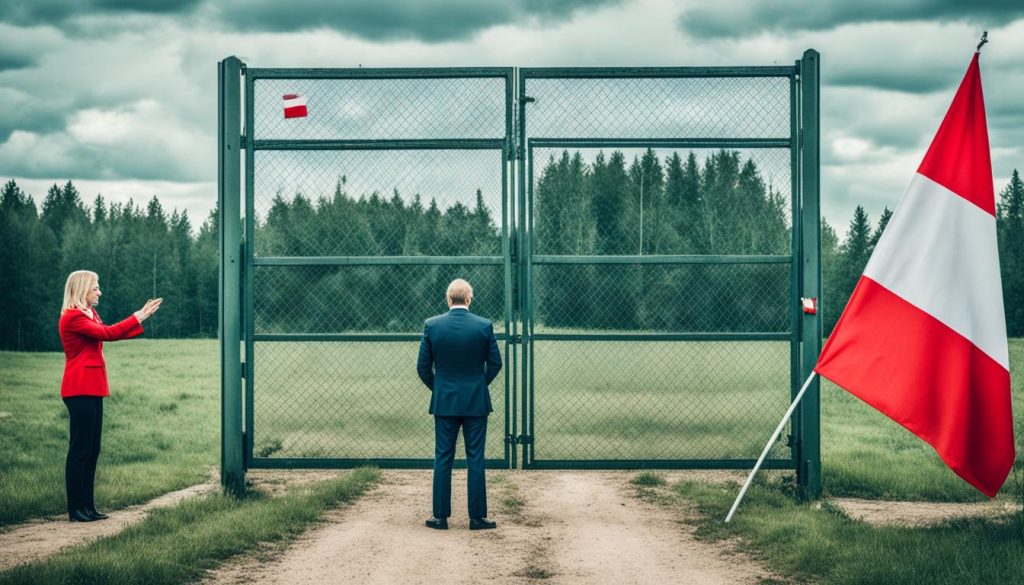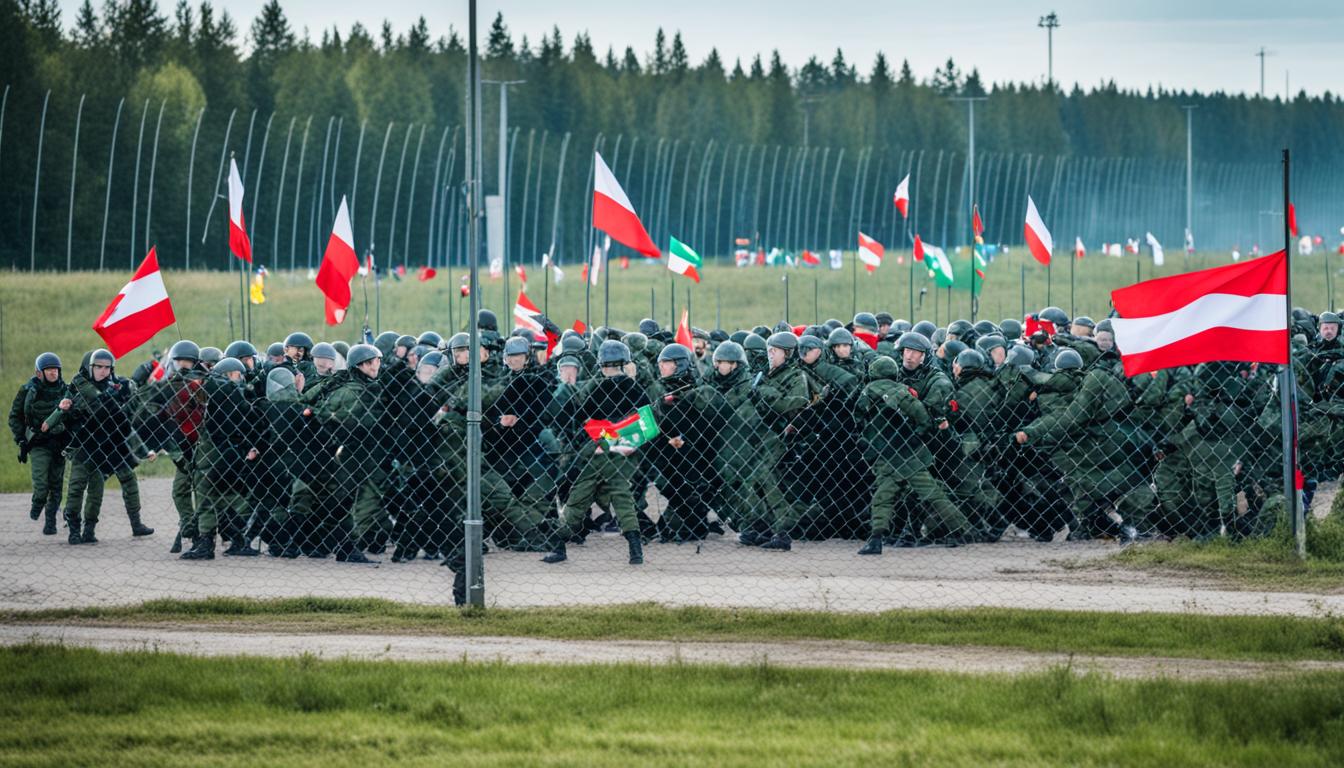The Poland-Belarus border is seeing rising tensions. This is getting attention from across the world. It’s not just about these two countries. It reflects bigger problems in Eastern Europe. The issue combines military build-ups, migration, and politics.
People caught in the middle are facing tough times. This situation calls for urgent help. Poland and Belarus are making their border security stricter. The European Union is keeping a close watch, hoping to solve the complex issues.
Key Takeaways
- The Poland-Belarus border zone is at the heart of deepening security concerns.
- Recent increase in military presence at the border has escalated tensions significantly.
- Migration issues are a critical element of the border crisis narrative.
- Responses from both Poland and Belarus are continually evolving amidst this tense atmosphere.
- Statements by European Union officials underscore the gravity of these tensions.
- Understanding the implications for regional stability is paramount for international observers.
Understanding the Poland Belarus Border Dispute
The ongoing clash at the Poland-Belarus border has grown into a major EU border crisis. Historical feuds are now key issues in Eastern European politics. This part looks into the border dispute’s background, recent events, and their wider political effects.
The Historical Origins of the Conflict
The conflict’s roots between Poland and Belarus dive deep into a complex history. Wars, changing boundaries, and alliances have left deep impacts. They have shaped how both countries see themselves and their land claims today.
Recent Developments in the Border Tensions
Lately, tensions flared up as Belarus allegedly helped migrants reach Poland. This act is seen as a reply to EU sanctions. In response, Poland strengthened its border, raising questions about its security measures and how it handles humanitarian issues during this crisis.
Impact of Geopolitical Dynamics on the Border Dispute
The geopolitics around the dispute are intricate, with NATO and Eastern Europe’s relationship being central. Poland’s NATO membership stands in stark contrast to Belarus’s alliance with Russia. This situation creates a tense border that highlights the wider clash between Western links and the Eastern bloc.
The world is keenly observing as it’s clear solving this border conflict will need careful thought. It involves looking back at historical issues, tackling present humanitarian challenges, and dealing with complex political and loyalty networks.
Political Repercussions and International Stances

The border crisis between Poland and Belarus has sparked important global reactions. Experts and leaders are closely watching as it unfolds. This situation highlights the need to keep global peace.
The EU has taken a stern approach. It has introduced sanctions against sectors in Belarus. These measures aim to end the conflict and push for peace.
“The use of restrictive measures is one of the EU’s tools to promote the principles of democracy, rule of law and respect for human rights.” – Official EU Statement
Poland, being close to Belarus and part of the EU, aligns its policies with the EU. Meanwhile, Belarus finds support from countries like Russia. This has created a divide on the international stage.
Regional conflicts like this could affect global peace. Watching how nations respond and change their policies is crucial.
- Detailed review of EU sanctions and their intended impact on Belarus.
- Analysis of Poland’s bilateral relations with neighbouring EU countries amid the crisis.
- Insights into the diplomatic approaches advocated by non-EU nations.
Here’s a look at different global responses to the tension at the Poland-Belarus border:
| Nation/Entity | Type of Response | Impact on Relations |
|---|---|---|
| European Union | Sanctions | Tense relations with Belarus, solidified unity within EU |
| Russia | Diplomatic Support | Strengthened ties with Belarus, strained interactions with EU and NATO |
| United States | Sanctions | Supportive of EU stance, heightened diplomatic pressure on Belarus |
| China | Neutral/Diplomatic Relations | Maintained balanced relations with both Belarus and EU |
This table shows the significant effects of the border dispute on global relations. It highlights how sanctions and diplomacy shape worldwide dynamics and security.
Humanitarian Concerns Amidst Border Strife
The situation at the Poland-Belarus border is getting worse, and people are suffering a lot. Many are stuck at the border, facing tough times. The conditions are getting tougher, especially for those seeking a new home.
The Plight of Migrants and Asylum Seekers
Many people are running away from danger and looking for safety. But their journey is filled with challenges. They face terrible conditions and their rights are often ignored. They desperately need basic things like food and shelter.
Human Rights Organisations’ Involvement and Advocacy
Groups like UNHCR and Amnesty International are helping out a lot. They give aid and stand up for the rights of refugees. They’re working hard to make things better and to get everyone the help they need. However, their work is tough because of politics.
Conclusion
This article shows that solving tensions at the Poland-Belarus border needs many to work together. Focused efforts in conflict resolution and border management are essential. International bodies good at dealing with geopolitical issues should help come up with a respectful solution. This must follow international law rules. Such steps are key to long-lasting geopolitical stability in the area.
The relationship between Poland and Belarus has been troubled by past and recent problems. A well-rounded answer is needed. It must have political support and a caring approach.
International experts and officials from both countries have suggested several ways out. They’ve talked about diplomatic meetings, economic deals, and better border control to improve security. These steps must be fair and legal. How well they work will mostly depend on how they are put into action. They must stick to international rules and work together, especially within the European Union.
The deadlock at the border is a sign of bigger issues that go beyond countries. It shows we need a clear, joint way to handle crises. The EU’s unity is very important for a peaceful solution that respects everyone’s rights. The situation reminds us that keeping stability in such areas is delicate. It involves facing both old complaints and new geopolitical problems. The solution comes from the world’s willingness to talk and work together. They must follow international law and kindness.
FAQ
What are the main causes of escalating tensions along the Poland-Belarus border?
The main reasons are increased military moves, political stand-offs, and a migration crisis started by Belarus. This crisis is seen as hybrid warfare against the EU.
How has the historical relationship between Poland and Belarus contributed to the current border crisis?
The history of both nations, involving old grievances and different political paths, has shaped their relations. This past plays a big part in today’s border tensions.
What recent developments have occurred in the ongoing conflict at the Poland-Belarus border?
Recently, more migrants have tried crossing into Poland. Poland has built barriers, and there have been diplomatic spats. These show the growing tensions between the two countries.
What role do geopolitical dynamics, such as NATO-Eastern Europe relations and EU sanctions, play in this border dispute?
These dynamics are key. NATO’s promise to protect Eastern Europe is challenged. EU sanctions against Belarus are seen as tough steps. Both impact the region’s stability and worldwide relations.
How have international sanctions impacted the political situation in Belarus?
The EU and others have sanctioned Belarus, putting it in a tight spot economically and diplomatically. This may make Belarus use migration more as a political strategy.
What has been the diplomatic response from countries such as Russia, the United States, and China regarding the border tensions?
Russia backs Belarus. The US and China have been more careful. Their reactions reflect their wider interests in the region and ties with the EU and NATO.
What humanitarian concerns have arisen due to the border strife between Poland and Belarus?
There are big humanitarian worries, like rights abuses and bad conditions for migrants. They lack basic needs and legal help.
How are human rights organisations involved in addressing the situation at the Poland-Belarus border?
Groups like UNHCR and Amnesty International are fighting for people’s rights. They offer aid and ask for global action to help those in need at the border.
How might the situation at the Poland-Belarus border impact global security?
This crisis could shake up the region. It could hurt international ties, mess with alliances, and make migration a weapon. This affects global security.
What are potential solutions to address the conflict and stabilise the situation at the Poland-Belarus border?
Solutions could include teamwork in diplomacy, following international law, coordinated aid, and talks between the EU, NATO, and involved nations to solve the crisis.



